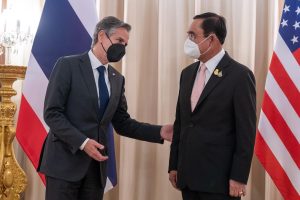U.S. Secretary of State Antony Blinken has criticized Southeast Asian governments for their response to the military coup and ensuing political turmoil in Myanmar, urging them to take a harder line toward the country’s military administration.
Blinken made the measured (and very diplomatic) criticisms during a news conference in Bangkok, where he made a one-day visit after attending the G-20 Foreign Ministers’ Meeting in Bali.
The top U.S. diplomat said it was “unfortunate” that violence and state repression in Myanmar was continuing nearly 18 months after February 2021 coup that overthrew the National League for Democracy (NLD) government led by Aung San Suu Kyi, tipping the country into political and economic turmoil.
“I think it’s unfortunately safe to say that we’ve seen no positive movement,” Blinken said, according to the Associated Press. “On the contrary, we continue to see the repression of the Burmese people who continue to see violence perpetrated by the regime.”
Stating that “all countries have to continue to speak clearly about what the regime is doing in its ongoing repression and brutality,” Blinken called on Southeast Asian nations to push harder for the junta to adhere to the Five-Point Consensus, a peace plan created by the Association of Southeast Asian Nations (ASEAN). Agreed at a special ASEAN meeting last April, the Consensus calls for an immediate halt to violence as a prelude to inclusive political talks involving “all parties,” but has seen scant progress in the 15 months since.
“Regional support for the regime’s adherence to the five point consensus developed by ASEAN is critical – that has not happened,” Blinken said. “The ASEAN countries need to hold the regime accountable for that … continue to demand the cessation of violence and release of prisoners.” During his stop in Thailand, Blinken also met in private with a number of young democracy activists from Myanmar.
His trip came the week after ASEAN’s special envoy for Myanmar, Cambodia’s Foreign Minister Prak Sokhonn, returned from his second mission to the country. While the June 30-July 2 visit yielded some incremental progress, it served above all to demonstrate just how sluggish and selective Myanmar’s military administration has been in its implementation of the Five-Point Consensus. (Junta leader Senior Gen. Min Aung Hlaing spent much of his time with Prak Sokhonn describing to him the “terrorist attacks” carried out by the anti-coup resistance.)
In this sense, it once again called into question the viability of the Five-Point Consensus itself, which has always depended on the junta’s good faith cooperation. As Prak Sokhonn’s second mission showed, such cooperation is unlikely unless the military administration succeeds in repressing and reducing the resistance to such an extent that it can afford to be magnanimous, or weakens to the point that it sees benefits in compromise. The National Unity Government and the anti-coup resistance are also rightly suspicious of negotiations, barring significant pre-concessions by the military.
ASEAN is unlikely to take a similarly punitive line to more distant Western countries, both for reasons of temperament – the bloc prizes dialogue and process, even when these are counterproductive – and because of the difficulty of mustering the necessary consensus. While ASEAN has hardened its stance against the junta since the coup, having excluded the junta’s representatives from high-level meetings of the bloc since October, it continues to eschew the sorts of punitive economic sanctions that have been favored by the U.S. and other Western countries. In any event, history offers few signs that a more punitive ASEAN stance would help with the implementation of the Five-Point Consensus.
In the end, the determining factor will most likely be the evolving political situation inside Myanmar. Short of active material support for the NUG and the armed resistance that it represents – a step that the U.S. has also notably refrained from taking, despite Blinken’s promise to seek ways for Washington and its partners put more “pressure” on the junta – ASEAN’s peace process will continue to nibble around the edges of the country’s conflict.

































